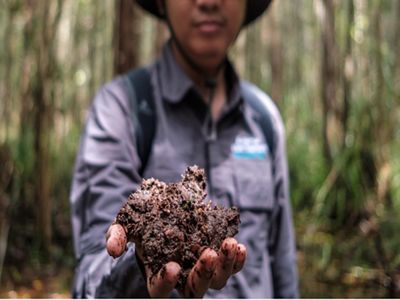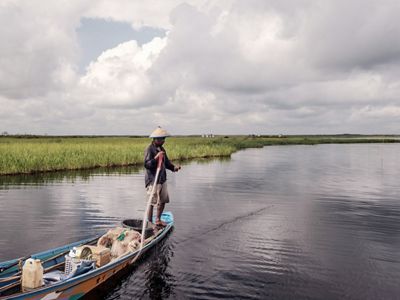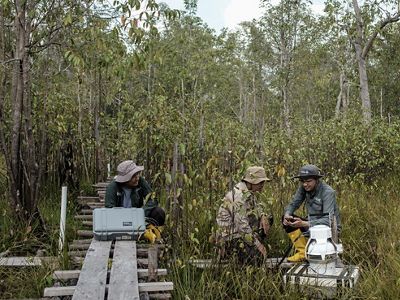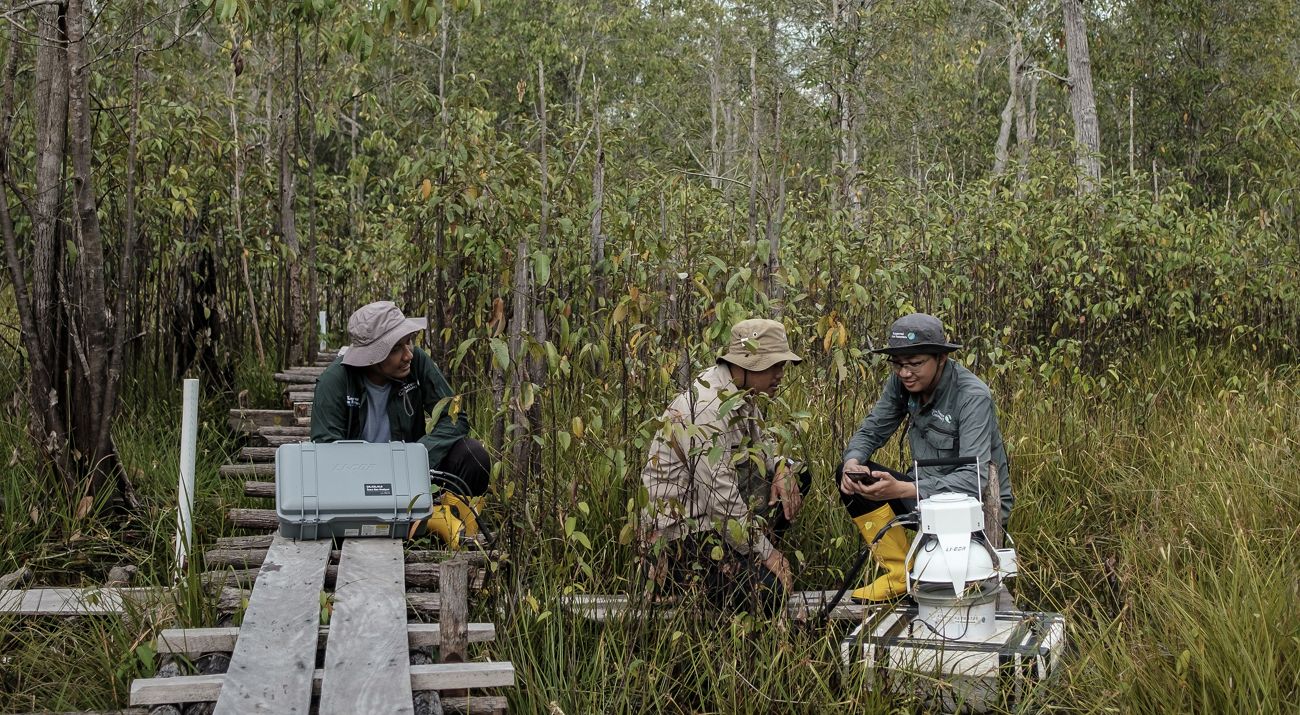Peat and Mangrove Ecosystems Key to Meeting Emission Reduction Targets in Southeast Asia
Media Contacts
-
Meita Annissa
Public Communications Manager YKAN
Yayasan Konservasi Alam Nusantara
Email: meita.annissa@ykan.or.id
A new joint study found that peat and mangrove ecosystems could be key to meeting emissions reduction targets for countries in Southeast Asia. The findings suggest that more than half of carbon emissions from land use in Southeast Asia can be mitigated through the conservation and restoration of peatlands and mangroves.
"Conserving and restoring Southeast Asia's large carbon stocks of peat and mangrove ecosystems could mitigate about 770 megatons of CO2 equivalent (MtCO2e) per year, equivalent to almost double Malaysia's national greenhouse gas emissions by 2023.

Although these two ecosystems only occupy 5.4% of Southeast Asia's land area," said Sigit Sasmito, a researcher from the Center for Tropical Water and Aquatic Ecosystem Research (TropWATER), James Cook University, Australia.
The findings were obtained after research related to land use changes in 2001 - 2022, which contributed to greenhouse gas (GHG) emissions. Southeast Asia is responsible for about one-third of the world's carbon emissions due to land use change. Primarily driven by tropical peat swamp forests and mangroves, which include wildfires.
Researcher from the National Research and Innovation Agency (BRIN) Wahyu Catur Adinugroho said that three countries, namely Indonesia, Malaysia, and Vietnam, accounted for more than 90% of emissions in Southeast Asia from these emission sources. According to Wahyu, the magnitude of this emission contribution is in line with the area of peat and mangrove ecosystems, where Indonesia has the largest area of these two ecosystems, followed by Malaysia. "Despite being the largest contributor to emissions, Indonesia also has the largest potential for climate change mitigation through conservation and restoration activities because our country has 3.4 million ha of mangrove forests and 13.4 million ha of peatlands," Wahyu explained.

The study, which has just been published in the journal Nature Communications, involved researchers from Nanyang University Singapore, James Cook University Australia, Nanyang Technological University Singapore, Queensland University Australia, Bogor Agricultural University, the National Research and Innovation Agency (BRIN), the Ministry of Forestry, and Yayasan Konservasi Alam Nusantara (YKAN) - a non-profit, science-based organization - as well as several other researchers. The research results can be accessed at https://www.nature.com/articles/s41467-025-55892-0#Ack1.
Vital ecosystems for climate change mitigation
Indonesia has one of the world's largest tropical peatland and mangrove forests. Haruni Krisnawati, a climate change expert at the Ministry of Forestry and one of the authors of the study, said the two ecosystems share similar physical and ecological characteristics. In particular, the soil is saturated with water, and oxygen is limited for long periods. "These conditions lead to reduced decomposition of organic matter, making these ecosystems the most effective carbon sinks on Earth, storing large amounts of carbon in their soils," Haruni said.
In addition, more than 90% of the carbon stocks in these two wetlands are stored in the soil, not in the vegetation above. This means that most of the stored carbon is "unrecoverable," or vulnerable to carbon release from human activities, and if lost, is not easily recovered.
With these characteristics peatlands and mangroves are among the most efficient carbon sinks in the world, and are important natural solutions for mitigating climate change and helping countries achieve zero-carbon targets. "But when peatlands and mangroves are disturbed, usually by land conversion, they release large amounts of carbon into the atmosphere," explained Sigit, who also led the research.
Nisa Novita, one of the authors of the article and YKAN's Senior Manager of Forestry Carbon and Climate, said that conserving remaining peatlands and mangroves and restoring degraded wetland ecosystems are cost-effective natural climate solutions that could help countries in Southeast Asia meet their Nationally Determined Contribution (NDC) targets.
"This is particularly true for Indonesia, where the mitigation potential of wetland conservation and restoration alone could exceed the country's 2030 emissions reduction target under an unconditional mitigation scenario," Nisa said. A detailed analysis of this can be found in an earlier journal article in Environmental Letter. 1

YKAN is refining its greenhouse gas emissions calculations to assess the impact of conservation and restoration, particularly on peatlands. Measurements of greenhouse gas emissions from soils and water bodies are being conducted across a range of land cover types in Kalimantan and Sumatra.
From long-term monitoring of greenhouse gas emissions over several years, YKAN reports that rewetting oil palm plantations can reduce net carbon emissions by up to 34%.2 YKAN has also assessed gas emissions from hydrologically undisturbed peatlands in Muara Siran, East Kalimantan Province, and found that natural peatlands produce significant methane emissions with low CO2 emissions.3
World Wetlands Day
Not only for climate change mitigation, wetlands such as swamps, peatlands, and mangroves are also known as the earth's “kidneys” because they purify water. Wetlands are also able to protect against erosion and provide habitat for a variety of endemic animals, some of which are now threatened with extinction. It is important to recognize the significance of wetlands, each year on February 2 as World Wetlands Day to acknowledge their importance.
Indonesia is one of the countries that has complete types of wetland ecosystems, such as peatlands, mangroves, riparian, swamps, and rice fields. However, there is no verified data on how much area has been degraded and needs to be restored immediately. “In addition to making a major contribution to climate change, the restoration and protection of wetland ecosystems is also important beyond carbon benefits to protect community livelihoods and maintain high biodiversity and diverse ecosystems,” Nisa concluded.
1 https://iopscience.iop.org/article/10.1088/1748-9326/ac9e0a
2 https://www.sciencedirect.com/science/article/pii/S0048969724059850
3 https://www.nature.com/articles/s41598-024-62233-6
Yayasan Konservasi Alam Nusantara (YKAN) is a scientific-based non-profit organization that has been present in Indonesia since 2014. With the mission of protecting lands and waters as life support systems, we provide innovative solutions to realize the harmony of nature and humans through effective natural resource management, prioritizing a non-confrontational approach, and building a network of partnerships with all stakeholders for a sustainable Indonesia. For more information, visit ykan.or.id.


